- Home
- Janelle Taylor
Can't Stop Loving You Page 22
Can't Stop Loving You Read online
Page 22
“No,” Noah said shortly, as the sign-on screen came up. He gestured at it. “See? If you sign on from your home computer, you have the option of entering the password with your screen name just once so that it automatically goes in every time.”
“So there was no security.”
“Why would I need it? I never had anything to hide when I lived with Kelly, so that was how I set it up. I never changed it when Alan moved in. I never dreamed the guy would invade my privacy this way.”
Fury stormed through Noah’s gut—fury at himself, for being a trusting fool, and fury at Alan for violating his privacy, and perhaps committing a far worse crime.
“Maybe he didn’t,” Mariel said, laying a hand on Noah’s shoulder. “Maybe you’re jumping to conclusions.”
“I doubt it,” Noah said, logging on, then thumping his fingers on the desktop impatiently as the computer whirred, preparing to bring up the Internet server. “Sherry said that Mariel had sent her birth father the same note and photograph that she had sent to her birth mother. She said that she had been receiving e-mail from her birth father ever since—and that sometimes, they sent instant messages back and forth. She said it was always in the late afternoon hours, when Amber had just arrived home from school, and that sometimes she was with Amber when she corresponded with him. She said Amber was always careful to delete the messages because she didn’t want her parents to know what she was up to. I guess she thought that it would make them uncomfortable.”
“But maybe she had the wrong person,” Mariel told him.
He shook his head. “She told me the screen name, Mariel. It was my screen name. It had to be Alan, posing as me.”
“But why would he do it?”
“Who the hell knows? Because Amber is a vulnerable teenager, and he’s some kind of twisted pervert. Because she’s a beautiful young girl who unwittingly broadcast her picture over the Internet without realizing that it might fall into the wrong hands.”
The sign-on screen came up, and an electronic voice announced, “You’ve got mail.”
“Her screen name is Indegrl, Noah,” Mariel said quietly, and she spelled it for him. “Just so you know what to look for.”
Noah nodded. Indegrl.
Her birthday was Independence Day. A lump rose in his throat, and he forced it back. He couldn’t afford to get sidetracked by his emotions now. He had to find out what the hell was going on.
He clicked on the mailbox icon and saw a long list of incoming messages. He glanced over them disinterestedly, noting that there was nothing out of the ordinary. Then he checked in the file that held his recent incoming and outgoing mail. There was nothing unusual there, either.
“He probably would have deleted the messages,” he realized desolately, shoving the mouse away from him in disgust. “There’s no way to know whether he corresponded with her.”
“Yes there is,” Mariel said, reaching past him for the mouse. Her herbal scent enveloped him, comforting him somehow, despite his distress. “I use the same server, Noah. Even if you delete a message from the incoming mailbox, it stays in your personal electronic filing cabinet unless you delete it from there, too. Alan might not have known that you have to delete it from both places.”
“I didn’t know that either,” Noah said. He sat up straighter in his chair, staring at the screen as Mariel clicked on the file cabinet icon.
It opened, revealing a list of incoming mail. Noah recognized some of it as junk mail that he had deleted from his mailbox without even reading. He had assumed it would vanish from his system, but Mariel was right. There was a back-up copy of everything that had ever come in, right here in the file cabinet.
Mariel gasped and pointed at the screen.
“My God, there it is,” Noah said, his heart bolting in his chest. “There it is. The bastard. What the hell has he done with her?”
“Stay calm, Noah,” Mariel said. “I think we’re about to find out.”
Then she asked, her voice laced with trepidation, “You don’t think he’s capable of…of…”
“I don’t know,” Noah said bleakly. “He’s a stranger to me, Mariel. For all I know, he’s capable of anything at all.”
Mariel picked up another sheet of paper as it shot out of Noah’s ancient dot-matrix printer, glanced at it to make sure it was legible, and added it to the growing pile on the desk beside the computer.
Noah stretched and tried to rub the back of his neck, looking weary, and she fought the urge to reach out and knead his muscles for him.
“We’re almost done,” she noticed, checking the screen. They had almost reached the bottom of the list of outgoing messages that had been sent to Indegrlfrom Noah’s computer over a period lasting from Memorial Day weekend—the same time Mariel had received her message from Amber—through the second week of June, when the messages had suddenly stopped.
They had read through all of them before deciding to print them out as hard evidence.
So.
Now they knew.
Posing as Noah, Alan had indeed corresponded with Amber Steadman. It had sickened Mariel to read his e-mails to their daughter. All were brief, and most contained spelling and punctuation errors. Apparently, written correspondence wasn’t Alan’s strong suit.
Mostly, the letters were small talk. There was a lot of discussion of popular music and television shows and sports. Mariel’s fears had subsided a bit now that she had read the letters, yet she hadn’t entirely rid herself of the nagging worry that Alan had harmed Amber in some way after luring her to New York.
That, of course, was exactly what had happened. He had extended an invitation for Amber to come visit, and naturally, she had pounced on the offer, assuming she was going to be meeting her birth father at last.
Her e-mails were far more detailed than Alan’s, and Mariel’s heart ached as her daughter’s personality emerged in letter after letter. Amber was creative, speaking passionately about music and art and her love of playing the piano and performing. She was a bright student who got good grades, and she seemed to have a typical social life with a large circle of friends.
She was also deeply troubled over her parents’ separation. She spoke sparingly about the situation, yet her pain came through loudly and clearly. She was an adolescent only child whose world had been rocked, and she was desperately seeking some kind of stability.
Clearly, Alan had preyed upon her vulnerability, offering to have her come visit—and, if it worked out, to have her move in with him. He had painted a false picture of Noah’s life, portraying himself as a wealthy businessman who had much to offer his long-lost daughter. He had asked her to call him Daddy, which Amber had done, obviously having jumped at the chance to make herself a part of his life.
According to the plainly outlined e-mail plan, Amber had left home using baby-sitting money she had been saving all winter, hoping to buy herself a car when she turned sixteen.
She had taken a bus to the Port Authority on the day she had disappeared from Valley Falls, unrecognized later by those who were questioned by police because she had possessed the foresight to disguise herself. She had told Alan—lovingly referred to as “Daddy”—that she would wear make-up and one of the blond wigs she still had from a performance in last fall’s class play.
She had acknowledged that her parents would be worried about her disappearance, but had written that the anxiety over her whereabouts might do them good. At least it will bring them together again, she had written, and wistfully added, maybe even for good. After all, they’re only separated, and you never know.
Clearly, hurt as she was by their separation, she cared about her parents.
“We should call the Steadmans,” Noah said to Mariel, as if he had read her thoughts. He clicked on the Print icon, sending another letter to the printer. “Detective Brando, too. Or the police.”
She shook her head, an image flashing in her mind. She saw Henry Brando’s skeptical face, and heard an echo of his doubtful tone as he questi
oned them that day in the diner about Amber’s disappearance.
“Not yet, Noah,” she said firmly.
“Why not?” he asked, looking up at her with a surprised expression. “They need to know what’s going on. Her parents are worried sick. They deserve to know what we’ve found.”
“All we’ve found are e-mails written on your computer, outlining a plan to meet. Who’s to say you didn’t write these letters yourself? Who’s to say you’re not involved?”
“But I’m not. It was Alan.”
“You say it was Alan. I believe it was Alan. Why should the police? This doesn’t look good for you, Noah. Until we know more about what’s going on with Alan, I don’t think we should go to the police. Let’s try to find him first.”
Noah stared at her. “You want to withhold this information from her parents and the police just because it might implicate me?”
“Not forever. Just until we know more about what we’re dealing with. It sounds to me as though Alan was planning to spend some time with her here in New York.”
“How do we know he’s not a serial killer who lured her here to murder her?” Noah demanded, slamming his hand down on the desk. The top papers on the pile lifted in the draft, and Mariel caught one as it flew into the air.
She set it back on top of the pile and said firmly, unable to quite believe her own assuredness, “I doubt that Alan meant to kill her, Noah. I get the sense that he’s just a slacker who saw the chance to take advantage of a trusting teenaged girl. And don’t get me wrong,” she said, cutting him off with an abruptly raised hand as he started to speak, “it makes me sick to think of what he might have been planning. But we have to believe that she’s still alive, and that she’s someplace here in New York. That’s what I choose to believe. And I think we can find her if we start looking.”
He shrugged, brooding.
“Who are Alan’s friends?” she prodded. “Come on, Noah. We can talk to people who know him and see if anybody can give us a lead.”
“For all I know he has no friends,” Noah said. “He seems like a loner.”
“Then, let’s go through his room and see what we can find,” Mariel said, as the last letter came out of the printer. She put it on top of the sheaf on the desk, then headed for the closed door that led to Alan’s room.
Noah remained seated.
“Are you coming?” she asked him.
“I don’t think it’s right for me to protect myself, maybe at Amber’s expense.”
“That’s not what this is about, Noah. We just need a few hours, or maybe longer, to see if we can come up with anything on our own. If we don’t, we’ll go to her parents and the police, and we’ll pray that they believe us when we say you’re not involved.”
He sat for a moment longer, and she watched him, aching to hold him, to comfort him. Somehow she had regained her strength, finding hope in the information they had gleaned, even as Noah had become desolate, convinced that Amber had met dire trouble.
Mariel just couldn’t believe the worst.
And this time, she wasn’t going to give up and go home.
She was going to stay here and see it through until they found their daughter.
Only then would she allow herself to leave…
Or to seriously consider the alternative.
“Are you coming?” she asked Noah again.
This time, he nodded and stood, walking toward her.
The phone rang.
They looked at each other.
Then Noah bolted toward it, snatching up the receiver with a breathless, “Hello?”
Mariel saw his eyes narrow.
“David,” he said tersely. “Yes, I’m back in town.”
David, she knew, was his boss. For a few moments Noah only listened, his back to Mariel. But when he finally spoke, he turned so that she could see the stony expression on his face, and she realized what was coming.
“I understand, but I can’t possibly be there,” Noah said evenly. “I’m involved in a family crisis.”
There was another pause.
“I don’t think that’s any of your business, David. Whether or not she lived with me—whether or not I’ve even seen her in the past fifteen years—she’s still my daughter, and I’m going to find her.”
He was silent again, listening.
Mariel stood watching him, seeing the way the muscle in his jaw clenched before he spoke again.
“I’m sorry you feel that way, David. But I’m going to do what I have to do. I guess you’ll just have to do the same.”
Another pause.
Then Noah said abruptly, “I see. That’s what I expected. I’ll come by when this is over to pick up my things.”
With that, he hung up.
Mariel stared at him, waiting.
“I just got fired,” he informed her.
“I figured,” she said, and asked cautiously, “Are you okay?”
“I’m free,” Noah said with a shrug. “Right now, that’s all that matters. Maybe it’ll sink in later that I’m flat broke and unemployed. At the moment, I just don’t give a damn about anything but finding Amber.”
“Then, that’s what we’ll do,” she said, holding out her hand.
He took it.
She squeezed his fingers. “Everything’s going to be okay,” she said.
“Maybe,” he said.
And together, they went into his roommate’s room to begin searching for clues.
“This is it,” Noah realized, stopping short in front of a decrepit-looking building just off Lenox Avenue. It was a plain, ugly brick rectangle with crumbling cement steps, and unlike some of the other buildings on the block—faded brownstone-types whose glory days had ended a century ago—this one had clearly never been anything more than what it currently was: a rundown tenement in a rough neighborhood. The street was ominously deserted, and hip-hop music blasted from an open window somewhere above. The smell of rotting garbage permeated the warm summer day.
“Are you sure this is the right place?” Mariel asked, standing close at Noah’s side. “This place looks like a hell hole.”
“I’m not surprised,” Noah said, leading the way up the steps.
“Careful,” he said, pointing to a syringe just beside his foot. He sidestepped it and reached back to take Mariel’s hand, muttering, “This is dangerous. I should have come alone.”
“That makes a lot of sense,” she said sarcastically.
“No, you shouldn’t be in a place like this, Mariel,” he said, as a beat-up car raced down the street behind them, then screeched around the corner.
“Neither should you. And I hope to God Amber isn’t here,” she said heavily as they stepped into the dingy, smelly vestibule.
“I doubt it.” Noah consulted the notes he had scribbled on a yellow Post-it note back home, then shoved it back into his pocket. He had changed from his suit to jeans, and for that, he was grateful. He definitely didn’t want to be caught in this neighborhood looking like a yuppie.
“Alan lived in apartment 2B,” he informed Mariel.
“Then, let’s go.”
He put his foot on the bottom step of a steep flight that led upward, into cavernous darkness, and his sneaker crunched on broken glass. “Be careful,” he warned Mariel, hating that she was here with him.
“I’m fine,” she said brightly. Too brightly.
Together, they made their way to the second floor.
The hip-hop music was even more deafening here, but it wasn’t coming from apartment 2B. Noah knocked on the battered door, and a voice called from inside, “Yeah? Who’s there?”
He was startled by the instant response. He supposed he hadn’t really been expecting to find Alan’s former roommate at home—if, in fact, that was who had answered the knock. He had found the address, and Chas’s name, on the application he had asked Alan to fill out when he had answered Noah’s ad. At least something good had come from being married to a nitpicky lawyer for all those years. Not that
he had bothered to confirm the information Alan had supplied before inviting him to move in.
The application had been something Kelly would have thought of. And thank goodness Noah had, because Alan’s room had yielded nothing by way of clues to his lifestyle.
“Chas Brown?” he called. “I need to talk to you a minute. About your friend Alan Henning.”
The door was flung open. A surprisingly normallooking guy stood there, wearing jeans and a T-shirt. He was barefoot and unshaven, and his blondish hair was long and straggly, but he could have stepped off a stage at a rock concert, Kurt Cobain resurrected. Nothing menacing about him.
“I’m Chas,” he said, and took a drag from the lit cigarette in his hand before saying, “If you’re talking about the asshole who just moved out of here, he’s no friend of mine.”
That didn’t bode well, Noah thought, as he quickly corrected himself. “I’m sorry, I meant to say your roommate. Alan Henning was your roommate, right?”
Chas nodded and regarded them warily. “What do you want? Are you cops?”
“No.”
“Are you sure? Because it wouldn’t surprise me if the cops showed up looking for him.”
Uh-oh.
“No, I’m just his roommate,” Noah said.
“Yeah, well, you have my sympathy, dude. He rip you off, too?”
“What do you mean?” Noah asked.
“Look, you want to come in?” Chas asked, holding the door open wider. “The place isn’t great, but it’s the best I can do on my salary.”
As he stepped over the threshold and saw the dingy surroundings, Noah remembered that he no longer had a salary. He thought about his apartment downtown, comparing it to this place, then constrained the panic that tried to push its way into his consciousness. One thing at a time.
“What do you do?” Mariel asked politely, as though they were at a cocktail party instead of in this cramped, rundown, sparsely furnished apartment.
“I’m a social worker,” Chas said, leaning forward and flicking the ash from his cigarette onto the floor in the hallway before closing the door. “I work with Harlem kids who have been abused. Figured I might as well live in the neighborhood, you know?”

 Shadowing Ivy
Shadowing Ivy Chase The Wind
Chase The Wind By Candlelight
By Candlelight Kiss of The Christmas Wind
Kiss of The Christmas Wind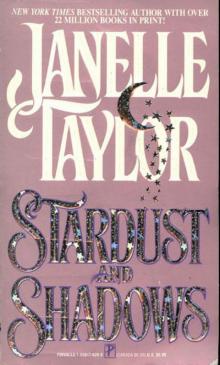 Stardust And Shadows
Stardust And Shadows Forever Ecstasy
Forever Ecstasy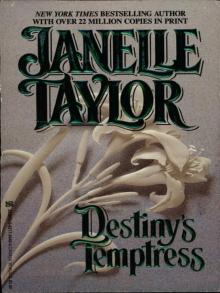 Destiny's Temprtress
Destiny's Temprtress Haunting Olivia
Haunting Olivia Wild Is My Love
Wild Is My Love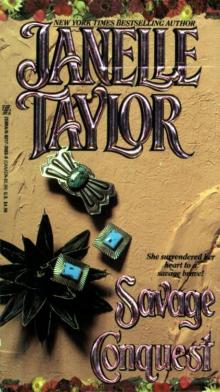 Savage Conquest
Savage Conquest Valley of Fire
Valley of Fire A Christmas Surprise
A Christmas Surprise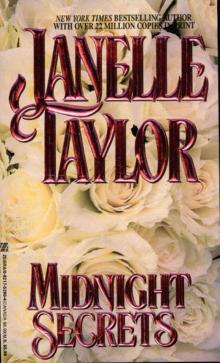 Midnight Secrets
Midnight Secrets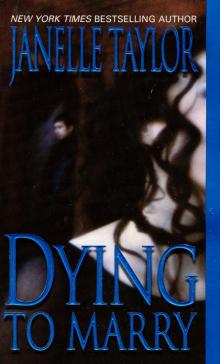 Dying To Marry
Dying To Marry Brazen Ecstasy
Brazen Ecstasy Someday Soon
Someday Soon Savage Ecstasy
Savage Ecstasy Can't Stop Loving You
Can't Stop Loving You Golden Torment
Golden Torment Forbidden Ecstasy
Forbidden Ecstasy Fortune's Flames
Fortune's Flames First Love Wild Love
First Love Wild Love Follow The Wind
Follow The Wind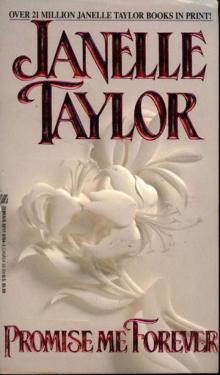 Promise Me Forever
Promise Me Forever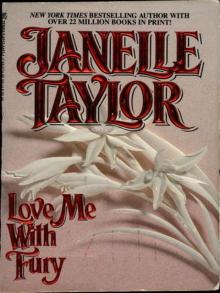 Love Me With Fury
Love Me With Fury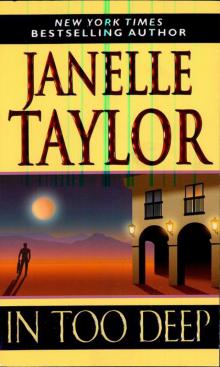 In Too Deep
In Too Deep Lakota Winds (Zebra Historical Romance)
Lakota Winds (Zebra Historical Romance)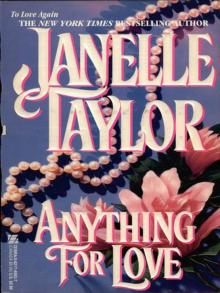 Anything For Love
Anything For Love Cherokee Storm
Cherokee Storm Straight From The Heart
Straight From The Heart Don't Go Home
Don't Go Home Wild Winds
Wild Winds Tender Ecstasy
Tender Ecstasy Defiant Ecstasy
Defiant Ecstasy Defiant Hearts
Defiant Hearts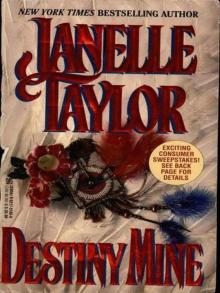 Destiny Mine
Destiny Mine Lakota Flower
Lakota Flower Passions Wild And Free
Passions Wild And Free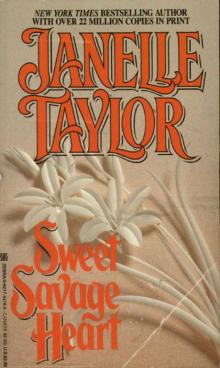 Sweet Savage Heart
Sweet Savage Heart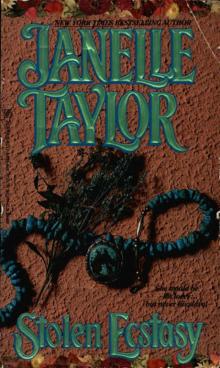 Stolen Ecstasy
Stolen Ecstasy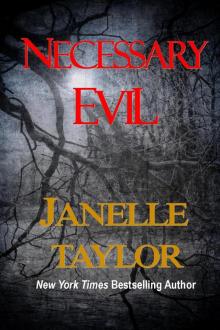 Necessary Evil
Necessary Evil Lakota Dawn
Lakota Dawn